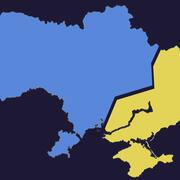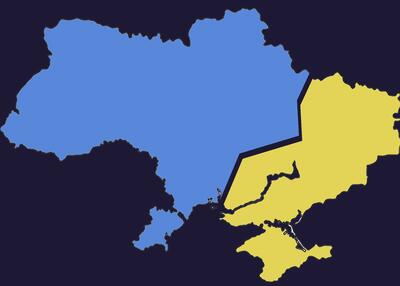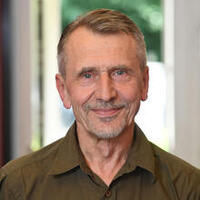
"Two Ukraines" Reconsidered
On Monday, February 11, Mykola Riabchuk, HURI Research Fellow, will present part of his research on modern Ukrainian, Russian, and Belarusian identities during our first Seminar in Ukrainian Studies of 2019. The talk, “'Two Ukraines' Reconsidered: What the Euromaidan and Russo-Ukrainian War Have Wrought and What They Have Not," takes place at 4:30 p.m. in CGIS South, Room S-030 (1730 Cambridge Street) and is open to the Harvard community and the wider public. Those who can't attend in person can watch the presentation on our YouTube channel, streamed live and available thereafter. 
Riabchuk is a senior research fellow at the Institute of Political and Nationalities Studies at the Academy of Sciences of Ukraine. He was one of the founders of Krytyka Magazine and served as chairman in the Ukrainian PEN Center (2014-2018). Starting toward the end of the 20th century, he played an active role in Ukraine’s literary scene, working as an editor of Vsevit, a journal that published translations of foreign literature, and then as an editor of Suchasnist magazine, which helped disseminate the work of rising Ukrainian writers. As a political scientist, he has published analytical works on Ukrainian politics, civil society, national identity and related topics.
In addition to providing new insights to specialists in relevant area studies, Riabchuk’s talk will be of interest to those studying nationalism, national identity construction, interethnic and international conflicts, conflict resolution, history of ideas, and media discourses in hybrid war. Riabchuk answered a few questions to tell us more about his seminar:
HURI: Your talk is titled "Two Ukraines" Reconsidered: What the Euromaidan and Russo-Ukrainian War Have Wrought and What They Have Not. What can we expect?
Riabchuk: The undeclared Russo-Ukrainian war has substantially changed political views and geopolitical orientations of many Ukrainians. Even more crucially, it caused some shift in identities and value systems.
The ethnically Russian and Russophone part of Ukrainian population, in particular, was challenged by the events and targeted by the Russian propaganda. Most of them, aside from those in Russia-occupied Crimea and Donbas, stood up for the Ukrainian cause and surprised many foreign observers, not to mention the Kremlin, with their newly discovered Ukrainian patriotism and civic loyalty. At the same time, Ukrainian society remained strikingly ambivalent about many key issues, exposing a substantial residual attachment to various aspects of the imagined “East Slavonic” community that are barely compatible with a genuinely Ukrainian loyalty and identity.
In my presentation, I intend to examine the available sociological data and to argue that the new, future-oriented type of Ukrainian identity is evolving in a painstaking struggle with old habits, views, and system of values. It may well supersede all the ethnic, linguistic, and other divides in Ukrainian society if the new social trust that emerged between various groups during the war against the common enemy is properly institutionalized and effectively supported by both the functional state and nascent civil society.
HURI: How does this topic fit into the research you are doing at HURI as a research fellow?
Riabchuk: It’s a part of my larger study of modern Ukrainian, Russian, and Belarusian identities as peculiar and interrelated discursive formations. The construction of these national identities is conceptualized as a protracted and incoherent process of emancipation from Slavia Orthodoxa – a premodern East Slavonic/Orthodox Christian ‘imagined community’ of ‘true believers.’ This ‘imagined community’ had been fused in the 18th century with the political ideology of the new-born Russian empire and then eventually modified into a similar quasi-religious community of the Soviet people. Its founding myth reinforces, and is reinforced by, very strong anti-Western forces that emphasize the primordial ‘otherness’ of the essentialized Slavonic/Orthodox civilization and reject Western values and institutions, including the notion of human rights, civic identity, and the liberal-democratic nation state as a viable alternative to the premodern patrimonial empire.
The East Slavonic/Orthodox Christian ‘imagined community’ appeared to be instrumental in the rejection of Western modernity and preservation of premodern identities, habits, and institutions. Deconstruction of its quasi-historical tenets and emancipation from its ideological spell is thus crucial for the development of all three East Slavonic nations. Ukraine seems to be the most advanced in the process of forging an overarching civic identity – as opposed to the predominant ‘statist’ identity in Russia and Belarus. Ukraine’s experience, therefore, is of primary concern in my research.
HURI: Why did you choose this particular topic for the seminar?
Riabchuk: I chose the most relevant, up-to-date aspect of my research topic. It also has quite an extensive historical aspect, but that is left merely in the footnotes of my presentation.
As Ukraine approaches the presidential election later in March and the parliamentary election in October, the identity issues come to the fore, exploited traditionally by some politicians and exacerbated by toxic Russian propaganda. I try to apply a balanced approach to Ukraine’s identity issues and to problematize both the overblown notions of Ukraine’s internal divides and triumphalist claims on the ‘rally-around-the-flag’ national consolidation.
Even though the forthcoming Ukrainian elections and political situation in general are not the primary topics of my talk, they would be partly addressed during my presentation and, certainly, during Q & A session.
HURI: Did you discover anything especially interesting or surprising in your research?
Riabchuk: My study of the Ukrainian nation building and, specifically, the construction of Ukrainian national identity was premised initially on the notion of fundamentally different trajectories of development of Ukrainian (colonial) and Russian (imperial) nations. The deeper scrutiny led me, however, to discover some similarity inasmuch as both nations (and Belarusians as well) encounter the same problem of emancipation from the imagined (and greatly mythologized) East Slavonic community as a precondition of their much-needed modernization. This process is hindered by the premodern and profoundly anti-Western type of that supranational identity – a kind of Orthodox Christian ‘ummah’.
 Mykola Riabchuk is a Senior Research Fellow at the Institute of Political and Nationalities Studies, Academy of Sciences of Ukraine, and a lecturer at the University of Warsaw and Ukrainian Catholic University in Lviv. He has served as the chairman of the Ukrainian PEN Center from 2014 to 2018 and chairs the jury of the Yuri Sheveliov award endowed by the Ukrainian PEN for the best essays. Riabchuk has penned several books and many articles on civil society, state/nation building, nationalism, national identity, and postcommunist transition in Eastern Europe, particularly in Ukraine. He is a HURI Research Fellow during the 2019 spring semester.
Mykola Riabchuk is a Senior Research Fellow at the Institute of Political and Nationalities Studies, Academy of Sciences of Ukraine, and a lecturer at the University of Warsaw and Ukrainian Catholic University in Lviv. He has served as the chairman of the Ukrainian PEN Center from 2014 to 2018 and chairs the jury of the Yuri Sheveliov award endowed by the Ukrainian PEN for the best essays. Riabchuk has penned several books and many articles on civil society, state/nation building, nationalism, national identity, and postcommunist transition in Eastern Europe, particularly in Ukraine. He is a HURI Research Fellow during the 2019 spring semester.